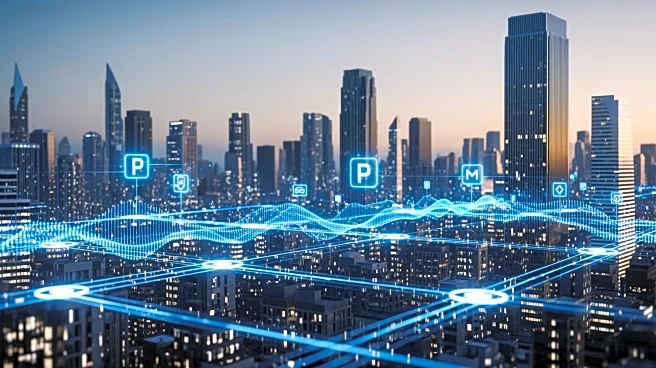What's Happening?
A new digital twin (DT) framework has been developed to improve urban parking management and mobility forecasting. This framework creates a virtual replica of physical systems, allowing for real-time monitoring,
simulation, and optimization of urban mobility. The DT integrates data from various sources, including infrastructure sensors, parking enforcement devices, and environmental data, to provide a comprehensive view of urban dynamics. The system aims to optimize resource allocation, improve service efficiency, and reduce congestion and pollution in cities. The framework has been applied in the city of Caserta, Italy, where it utilizes data from parking meters, slot sensors, and GPS devices used by parking enforcement agents. This integration allows for detailed simulations and predictive analyses, helping to manage urban mobility more effectively.
Why It's Important?
The implementation of a digital twin framework in urban environments represents a significant advancement in smart city technology. By enabling real-time data integration and predictive analytics, cities can better manage resources, reduce traffic congestion, and minimize environmental impacts. This technology has the potential to transform urban planning and management, leading to more efficient and sustainable cities. Stakeholders such as city planners, transportation agencies, and environmental groups stand to benefit from improved data-driven decision-making capabilities. The framework's ability to simulate future scenarios also provides valuable insights for long-term urban development strategies.
What's Next?
As the digital twin framework continues to be refined and implemented, cities may see increased adoption of this technology to address urban mobility challenges. Future developments could include expanding the framework to incorporate additional data sources and integrating it with other smart city initiatives. Stakeholders may explore partnerships to enhance the system's capabilities and apply it to other urban areas. The success of the framework in Caserta could serve as a model for other cities looking to improve their urban mobility management.
Beyond the Headlines
The adoption of digital twin technology in urban management raises important considerations regarding data privacy and security. As cities collect and integrate vast amounts of data, ensuring the protection of sensitive information becomes crucial. Additionally, the ethical implications of data-driven decision-making in public policy must be carefully examined. The long-term impact of digital twins on urban environments could lead to shifts in how cities are designed and operated, emphasizing the need for ongoing dialogue between technology developers, policymakers, and the public.












